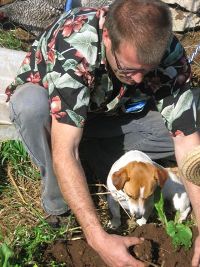It is half past six on a misty September morning. At least once every minute, I hear a cock crow. I am standing under an outside shower. Below me slopes a plantation of 500 olive trees. Below the olive trees is a river. Mist floats gently above this river. About 12km downstream, is the little town of Still Bay.
The day before, I was elbow-deep manure… worm, cow, horse and - just for good measure - a little bit of pig. As the water cascades down my body I ask myself the Holy Grail of all existentialist queries: How did I get here?
The answer is obvious, really. I am here because one morning, back in April, somebody smashed into my girlfriend’s car. My girlfriend’s work mate thought a recuperative weekend at her house in Still Bay was in order. Before we came to Still Bay, we were told that if we did nothing else all weekend, we simply had to go and visit the Wild Olive.
So we cycled over, arriving cold and hungry and just ahead of a storm, and met the lovely Hazel Mugford, her son Andrew and her right-hand man, Chris Thomas. Everything on the farm is lush, green and very fertile; and the greeting was even more wonderful. Not “hello”, but “You’re just in time. The scones will be coming out in five minutes.”
The visit for lunch turned into a five-hour forging of a friendship that has literally changed my life. The scones were delayed because the cream was too fresh to whisk. The jam was made on the farm. After tea, Chris gave us a tour of the vegetable gardens and wormeries. I was concerned to notice Hazel wandering around her garden too. I was hungry and she should have been in the kitchen. My concerns were unfounded: she was picking the salad for our lunch. And that, for me, was how the Wild Olive penetrated my consciousness. Yes, the worm farm was the best I had ever seen and the compost was great and the vegetable garden was the friendliest I had ever seen. But the thing that stays in my mind three months after our first visit, was the sensation of biting into freshly picked cocktail onions.
The author digs up new potatoes for lunch, helped by Bob the dog
Years ago when Hazel and Andrew first moved onto the farm, the land had been stripped and hardened by sheep farming. They had to enlist a digger to get holes into the ground for the olive trees. Now the soil is deep and rich and soft, and the land is a garden of Eden. If there is a restaurant that offers fresher food in South Africa, I want to eat there.
Now onto why I was under a shower at half past six in the morning, some months later, trying to get compost from under my fingernails.
Hazel has spent the last seven years living according to the tenets of permaculture. Permaculture is, to quote the Wild Olive’s website, “both a lifestyle ethic and a design system which utilises a systems thinking approach to create sustainable human habitats by analyzing and duplicating nature's patterns (ecology)”. She has studied and qualified as a permaculture designer and trainer, and now offers courses in permaculture, composting, vermiculture, and anything else you like in the field.
Hazel and Chris have got composting down to an art. Chris can take freshly cut garden refuse and have the best compost I have seen in just three weeks. The ground is so soft that even the corporate ladies with whom I did the weekend course were able to effortlessly dig over beds on the farm. The earthworms were so long and fat, they looked like baby snakes. All over the farm, chickens were busy preparing ground for the next beds of lettuces, radishes, coriander and anything else needed for the tastiest salads in the world.
One of the ethics of permaculture is care of people, and at any one time, there are one or two assistant-apprentices at Wild Olive. A Malawian family is currently in residence: Wycliff is in training; his wife Ruth is helping out and becoming a day hand in the kitchen; and his three-year-old daughter Polly is providing a delightful distraction. When Wycliff is ready, he will go back to Malawi to join Emmanuel, Hazel’s previous apprentice, to set up permaculture operations there.
As my friend and colleague in training Revel said: “This is such important information.” Commercial farming is about dominance over the land, and short-sighted maximising of yield; and the techniques used are killing the topsoil, taking far more out that we put in. We are flooding the land with fertilisers that are expensive and of no long-term value to the ground that feeds us. It is estimated that in subsistence-farming sub-continent of India, up to 80 000 small farmers have committed suicide because they cannot keep up with the costs of artificial farming methods. This weekend’s course taught me that there is a better way.
(Niels Colesky, Health24, September 2009)




 Publications
Publications
 Partners
Partners










